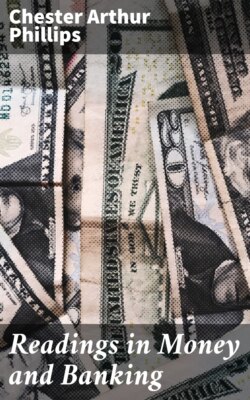Читать книгу Readings in Money and Banking - Chester Arthur Phillips - Страница 56
На сайте Литреса книга снята с продажи.
Arrangements for Resumption[12]
ОглавлениеTable of Contents
The Secretary of the Treasury now put the final touches on his arrangements for resumption. Partly by accident and partly through stress of circumstances, the Treasury gold reserve was defined, in later years, at a fixed and arbitrary minimum. The theory adopted by Mr. Sherman, however, in his early operations, was different and undoubtedly better. Following probably the practice of the Bank of England, he fixed his reserve at 40 per cent. of outstanding notes—"the smallest reserve," he wrote to Congress, "upon which resumption could be prudently commenced and successfully maintained." On this basis he held in the Treasury, on December 31, 1878, $114,193,000 gold in excess of outstanding gold certificates, which was a trifle over 40 per cent. of the Government notes then circulating outside the Treasury. Of this gold reserve, $95,500,000 had been obtained through sale of bonds, part of the coin being procured in Europe.
There remained now to be settled only the formal machinery of exchange between the Treasury and outside institutions. If the Treasury had left the banks to pursue unchanged their policy of keeping special gold deposits, the Government reserve would have been at once imperilled. If the banks had continued to present their individual drafts for redemption across the counter of the Sub-Treasury, any timid or blundering banker might have started a general drain of gold. Against these possibilities Mr. Sherman now took measures. He secured the admission of the New York Sub-Treasury as a member of the clearing-house. At New York and Boston the clearing-houses modified their rules, agreed to abolish "gold deposits" after January 1st, and to accept the legal tenders freely in discharge of balances against one another and against the Government. At the same time, the requirement of coin payment of customs duties was revoked, and public officers were directed to receive coin or legal tenders at the payer's option—a move of obvious propriety, since refusal to take notes in payment would merely send the importer to the Treasury's redemption office to convert them into coin. All these preliminaries had been formally and positively settled before the close of 1878. On December 17th, the premium on gold disappeared, for the first time since 1861; on January 1st, specie payments were quietly resumed.
